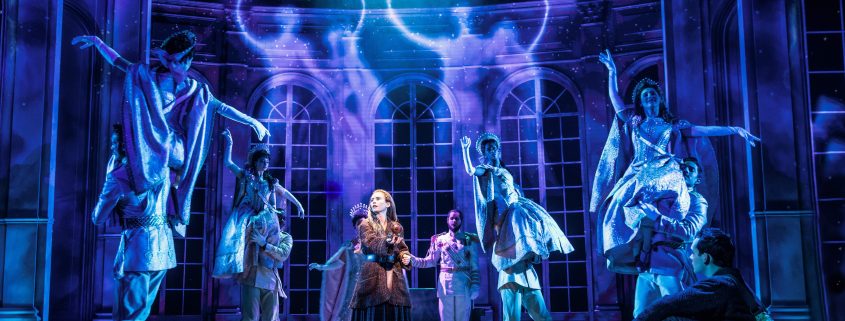‘Anastasia’ fails to live up to its promised splendor, glory

“Anastasia” promises a lot. It’s a show with ambition, a grand melodrama set against the backdrop of Europe in upheaval. Unfortunately, ambition doesn’t always equal success; in this case, it amounts to little more than fun and forgettable fluff.
The musical, adapted by playwright Terrance McNally from the 1997 animated film of the same name, begins in 1906, as 7-year-old Anastasia (Victoria Bingham) bids farewell to her grandmother who takes off for Paris. The musical then jumps to 1916, when the Bolsheviks deposes Russia’s royal family. Princess Anastasia is lost, presumed dead by most, and her grandmother (Joy Franz) is left alone in Paris without a family. Years later, after the Soviet regime has seized the country, two con-men enlist the help of an amnesiac named Anya (Lila Coogan) to try to convince the aging empress they have found her missing granddaughter.
The show is called “Anastasia,” so Anya’s true identity is never much of a mystery for the audience. The drama lies in the journey, rather than the fairly predictable destination. It’s a shame, then, that the journey isn’t that much more interesting.
The score, composed by Stephen Flaherty and Lynn Ahrens, boasts a few standout numbers, including the highly publicized “Journey to the Past,” and never hits a foul note. Darko Tresnjak’s direction is consistently solid, and the heavy reliance on digital backgrounds gives the show a polished — if somewhat corporate — feel.
No single element is bad, per se. But with only a few exceptions, none are particularly inspiring, either. Each song and artistic choice is a riff on something that came before. The show is perfectly professional, but that’s not exactly high praise.
One such exception is Edward Staudenmayer as Vlad, one of the con-men who brings Anya to Paris. As his part is smaller and more overtly comical, he isn’t burdened with the hyper-sincerity that characterizes the rest of the cast. His movements and expressions are exaggerated as if he stepped out of a vaudeville act. His big moment isn’t an emotional ballad, but rather an extended dance sequence that is far funnier than it has any right to be.
His dance partner and comedic counterpart, Countess Lily (Tari Kelly), brings the same manic energy to the stage. The pair’s mostly physical comedy managed to get most of the theater laughing while barely saying a word. None of the performances match their energy or showmanship, even in a show as melodramatic as this one.
This is not to say that there is no place for melodrama; a whole show of comedic dance numbers would be exhausting, after all.
Every musical needs a big heart-wrenching number, and “Anastasia” certainly delivers. Coogan gives an impressive rendition of “Once Upon a December,” one of the few songs to make the jump from the musical’s animated counterpart. But it is Anya’s duet with Dmitry (Stephen Brower), the younger and less goofy of the two con-men in “In a Crowd of Thousands,” that packs a bigger punch. It is sentimental and nostalgic, a moment of genuine emotion in a show that needs more of just that.
As a fun popcorn musical, “Anastasia” unquestionably succeeds. Like any middling pop song, it’s cute, sweet and catchy. But it isn’t the historical spectacle its marketing promised. Its sets are too digital, its songs too similar, its drama too pedestrian.
It’s blandly inoffensive and, as stage shows go, easily reproducible. It was designed to be: it began on Broadway and will continue its tour long after its Los Angeles shows are done. And while the show makes for a perfectly pleasant evening, it never makes good on its promises of opulence and splendor.

